by Lisa Cooke | Nov 3, 2017 | 01 What's New, British, Canadian, Newspaper, Records & databases, United States
Historic U.S. newspapers are featured in this week’s new and updated records collections, including Hawaii, Colorado, Georgia, and North Carolina. Also new this week are updated New York passenger lists, vital records for England, Welsh newspapers, military and census records for Canada, and Austrian parish records.

Historic U.S. Newspapers & More
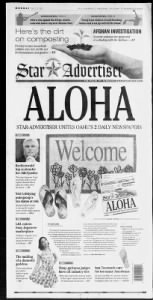
This week we were delighted to see lots of historic U.S. newspaper made available online. Newspapers are a fantastic way to find clues about your ancestors, especially when vital records are elusive, and also learn about their daily lives.
Hawaii. If you have family from Hawaii or are interested in Hawaiian history, then you’ll definitely want to check out these three new titles added to Newspapers.com:
In 2010, the Adviser and Star-Bulletin were merged to create the Honolulu Star-Advertiser. If you’re looking for ancestors or other family members in these papers, good places to start include personals columns, society pages, local interest columns, and the like.
Colorado. History Colorado (HC) recently digitized and added two historic Denver African-American newspapers: Statesman (1905-1912), and The Denver Star (1912-1918). While these papers covered news from African-American communities in “Colorado, Wyoming, Montana and the West,” they also covered local news from Denver’s Five Points district. These newspapers cover Denver’s African American culture and community, including its residents, businesses, and aspects of everyday life.
Georgia. Georgia Perimeter College Collection is now available online. The digital collection includes yearbooks, catalogs, and student newspapers from the 1960s to the 2010s. You can browse the collection by decade, date, format, or by the name of the institution at the time each item was published.
North Carolina. The newspaper of Belmont Abbey College in Belmont, NC has been digitized and made available online. There are 44 issues are available to browse spanning from 1971-1979 with issues published every other month. Among the news headlines are graduations, alumni news, fundraising campaigns, appointments of new abbots, and changes on campus reflective of this decade’s larger cultural movements.
New York. MyHeritage has updated their collection of Ellis Island and Other New York Passenger Lists, 1820-1957. This collection contains millions of records of individuals arriving at the port of New York, including individuals who arrived at three well-known immigrant processing stations: Castle Garden (1855-1890), the Barge Office (1890-1892), and Ellis Island (1892-1957).
England – Portsmouth Collection
Findmypast has an exciting new collection for Portsmouth, Hampshire. This collection of scanned images of original handwritten documents contains more than 1.3 million historical records spanning 1538 – 1917. When complete, the collection will be the largest repository of Portsmouth family history records available online. Click the links below to explore the 5 collections:
Also new this week from The British Newspaper Archive is the Ross Gazette. This newspaper is published by Tindle Newspapers in Ross-on-Wye, Herefordshire, England, spanning 1867 – 1910. This collection currently has over 2,000 issues available now, with more continuing to be added.
Welsh Newspapers
 Even more historic newspapers are new this week as we head over to Wales. The British Newspaper Archive recently added the Rhyl Journal (Clywd, 1877 – 1897) and Cambrian News (Dyfed, 1863 – 1882) to their database.
Even more historic newspapers are new this week as we head over to Wales. The British Newspaper Archive recently added the Rhyl Journal (Clywd, 1877 – 1897) and Cambrian News (Dyfed, 1863 – 1882) to their database.
Though these collections are relatively small, they can provide wonderful clues and details about your ancestors living in Wales in the 19th century.
Canada – Military and Census Records
New for Canada this week are Certificates of Military Instruction at Fold3, which includes records from 1867 to 1932. There were initially two types of certificates: First Class (battalion-level officers) and Second Class (company-level officers). The information you can find in the certificates in this collection typically includes the man’s name, rank, and residence; the certificate type and date; and the name and location of the school.
The 1921 Canadian Census is now available for free at the Library and Archives Canada. The 1921 Census marked the sixth regularly scheduled collection of national statistics. It officially began on June 1, 1921. This research tool contains 8,800,617 records that are searchable by name.
Austria – Parish Records
Over at Ancestry.com, a new collection of Salzburg Catholic Baptisms, Marriages, and Burials, 1600-1930 is now available. From the description: “This collection contains parish registers from numerous Catholic communities in the city Salzburg, Austria as well as numerous communities that today are part of the Austrian state of Salzburg.” Note that these records are in German, and you should search using German words and location spellings.
Native American Records
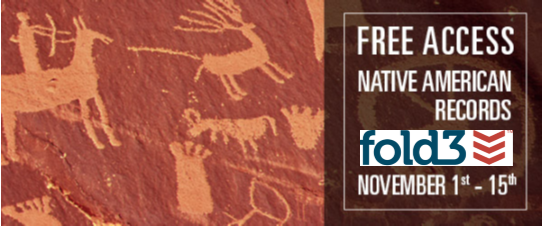 Do you have Native American ancestry? Or are you interested in Native American history? Then explore Fold3’s Native American Collection for free November 1-15, 2017. Their unique collection includes records, documents, and photos never before seen online. All you need is a free Fold3 account to start exploring!
Do you have Native American ancestry? Or are you interested in Native American history? Then explore Fold3’s Native American Collection for free November 1-15, 2017. Their unique collection includes records, documents, and photos never before seen online. All you need is a free Fold3 account to start exploring!
Disclosure: This page contains affiliate links and Genealogy Gems will be compensated if you make a purchase after clicking on these links (at no additional cost to you). Thank you for supporting this free podcast and blog!
by Lisa Cooke | Oct 28, 2016 | 01 What's New
This week, we set sail to the islands with new and updated genealogical records for Hawaiian and Irish genealogy. Passenger lists and denization records shine a light on ancestors who walked the shores of beautiful Hawaii and previously classified records are revealed in the Easter Rising collections for Ireland. Also this week, the Canadian Census for 1901, and records for Maine, Kentucky, and the country of Benin.
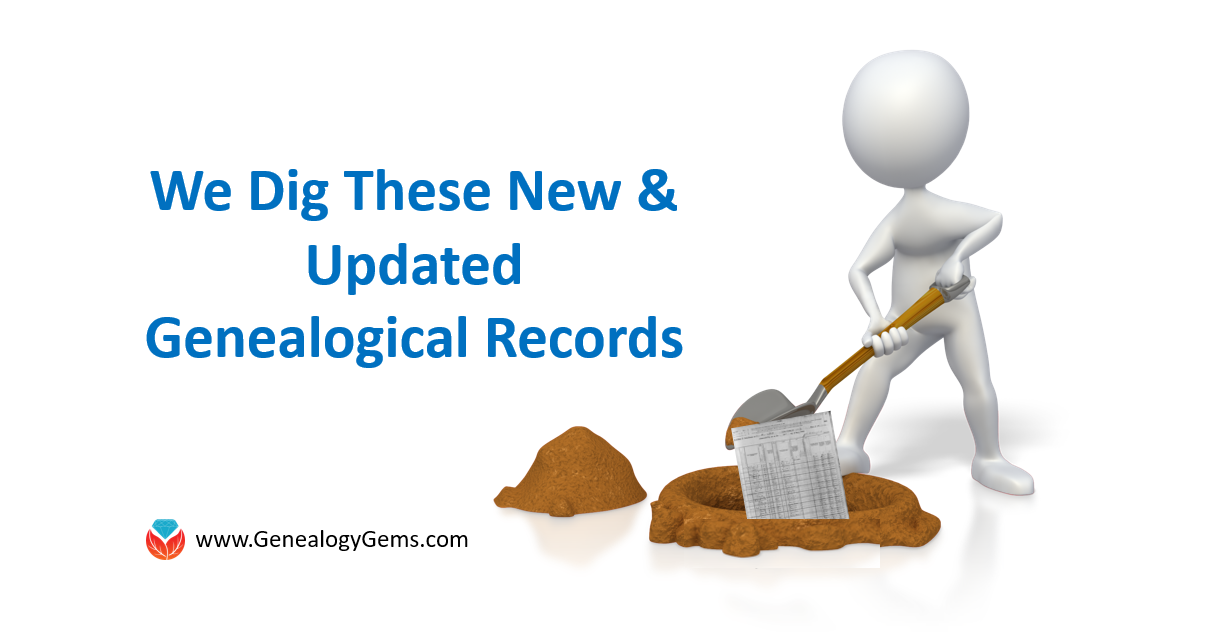
United States – Hawaii – Passenger Lists
This week at Ancestry, a new collection titled Hawaii, Passenger Lists, 1843-1898 is now available. It is searchable by name, birth, date of arrival, or date of departure. Specifically, this database includes passenger lists for ships arriving at and departing from ports in Hawaii between 1843 and 1898. This is both an index and a collection of digital images. Information may include a given and surname, age, gender, nationality or last place of residence, destination, ship name, and the date and place of departure or arrival. The names found in the index are linked to actual images of the manifests, digitized from originals at the Hawaii State Archives.
United States – Hawaii – Denization Records
Another new collection at Ancestry is the Hawaii, Denization Records, for 1846-1849, 1883-1898. Denization is the process used to grant a status similar to permanent residency and gave rights to denizens, such as the right to own land. These records are actually applications made by handwritten letters before 1895 and pre-printed application forms after that.
Information will vary, but may include:
- Name
- Age
- Occupation
- Place of origin
- Arrival date
- Record date
- Current residence
United States – Hawaii – Certificates of Identification
Lastly, Ancestry’s new collection Hawaii, Certificates of Identification for Chinese Arrivals, 1895-1898 may help find those connections back to mainland China.
This collection of certificates of identification for Chinese arrivals may include:
- Name
- Date of arrival
- Ship
- Permit number
- Photograph locator
Note: Photographs are not available in this collection. Photographs of arrivals were taken and kept in a Deposit Book. You can obtain copies of these photographs from the Hawaii State Archives using the locator information that is provided on each certificate.
Ireland – Easter Rising Collection
Findmypast has added over 48,000 additional records to their Easter Rising & Ireland Under Martial Law 1916-1921 collection. If you are not familiar with the Easter Rising, it took place on Easter Monday, April 24, 1916. A group of Irish nationalists announced the establishment of the Irish Republic and staged a rebellion against the British government in Ireland.

These were once classified records, but have now been digitized and can be browsed. These unique records document the struggles of life under martial law in Ireland and also contain details of both soldiers and civilians who participated or were affected by the Easter Rising of April 1916.
The collection contains the names of the hundreds of people who were detained and interned in prisons across Ireland, England, and Wales. Further, the internment files contain reports on individual detainees which record their charges, trial, and sentence as well as personal letters from prisoners or their relatives testifying to their innocence. Locating an ancestor in this collection would be a very special find.
Canada – Census
Findmypast has just added the Canada Census for 1901. It contains over 5.1 million records. The 1901 census was the first Canadian census to ask questions about religion, birthplace, citizenship, and immigration.
Each record includes a transcript and link to the digital image of the original census form. These census records will also list the name, date of birth, place of birth, marital status, relationship to head of household, race or tribe, immigration year, and naturalization year of each household member.
United States – Maine – Military
FamilySearch has added two new collections this week and one of them is Maine, World War I Draft Registration Index, 1917-1919. I don’t know if we have mentioned lately, but FamilySearch.org is free for everyone. This new collection for Maine is just one of hundreds available for genealogy records.
Records found in this collection generally conta in the following information:
in the following information:
- Name
- Place and date of birth
- Marital Status
- Residence
- Nationality and race
- Occupation
- Relatives’ names
United States – Kentucky – Marriages
This past summer, the Special Collections Research Center at University of Kentucky Libraries and the Fayette County Clerk’s Office developed a pilot project that will ultimately provide online access to Colored Marriage Indexes between the years of 1866-1882 and 1958-1968. The purpose of the project is to provide researchers with greater online access to these documents pertaining to African Americans in Kentucky.
The four volumes of the Colored Marriage Indexes are used to locate early marriage bonds of African Americans in Lexington, Kentucky. These indexes contain the name of each bride and groom and the page number of the marriage bond held at the Fayette County Clerk’s Office.
The digitized versions of the indexes are now freely available to the public on ExploreUK, UK’s digital library. The typed indexes have been run through optical character recognition (OCR) and are searchable.
Africa – Benin – Deaths
Death records may contain the following information:
by Lisa Cooke | Aug 20, 2018 | 01 What's New, German
German place names have changed dramatically over time, so it can be challenging to identify your German ancestors’ place of origin. This free online tool helps family historians navigate changes in German place names, jurisdictions, and boundaries. Thank you to...
by Lisa Cooke | Nov 18, 2017 | 01 What's New, Professional Genealogy, Societies
A professional genealogist can help you apply to lineage societies. Joining is a time-honored way to honor your heritage and document your family history research. But it’s not easy! Here’s why even experienced genealogists may want to hire a professional to help with the process.

Thanks to Legacy Tree Genealogists for supplying this guest blog post.
Applying to lineage societies
Do you have an ancestor who lived in Colonial America when the Revolutionary War was fought, or perhaps earlier in Jamestown, Virginia? Does your ancestry extend back to New England when the Mayflower arrived? If so, there are various lineage societies you could consider joining:
 While each organization has different requirements for their lineage society application, most have the same principles: prove a connection from yourself to the person of interest by use of vital records (where available). Where not available, other documentation that proves family connections can be used. (DAR now also accepts DNA evidence.)
While each organization has different requirements for their lineage society application, most have the same principles: prove a connection from yourself to the person of interest by use of vital records (where available). Where not available, other documentation that proves family connections can be used. (DAR now also accepts DNA evidence.)
You may not know that most societies allow you to “piggy-back” on applications they have previously accepted. Let’s say your second cousin Steve already joined a society based on your common patriot (or pioneer) ancestor, Alexander Smith. You would just need to provide documentation proving your connection to your parents, your relevant parent’s connection to his/her parents, and your relevant grandparent’s connection to your common great-grandparents, who were already mentioned in Steve’s application. You may then be able to reference Steve’s application for the remainder of the lineage going back to Alexander Smith.
Overall, this may sound like a simple process. But it often takes quite a bit of work because the records needed to prove each generational link are not always readily available–and sometimes they just don’t exist at all.
Why get help when applying to lineage societies
Below are five ways that a professional genealogist can help you apply to lineage societies:
1. Help you determine how to apply. As we mentioned, each lineage society has different requirements, so you’ll want to be sure you know what they expect in order to be as efficient as possible in gathering documentation. A professional can help you determine exactly what documentation is required and locate contact information for those with whom you need to work to submit your application.
2. Identify where your research should stop and start. There is no need to reinvent the wheel, as the saying goes. If your lineage ties into one that has already been acceptably documented by another member of the society, you should use it! A professional genealogist can help you identify any previous lineage society applications that have already been approved for your lineage. This single step can save you a lot of time and money.
3. Organize your information. A professional genealogist can work with you to determine what documentation you already have and what you will need to order. They can help you order copies of missing vital records or find acceptable substitutes in archives, libraries, and online.
 4. Conduct in-depth research as needed. Many times, at least one ‘problem’ generation requires in-depth research, circumstantial evidence, and a proof summary in order to make the connection. A well-written proof summary explains how all the circumstantial evidence fits together to support the generational link, and often aids the applicant in obtaining membership when not enough concrete documentation is available (or when it conflicts). This often involves delving into land records, tax lists, probate records, and other more obscure sources to find any and all clues and pieces of information that can be used to tie two generations together. It can be a time-consuming task. A professional genealogist can do this efficiently and thoroughly.
4. Conduct in-depth research as needed. Many times, at least one ‘problem’ generation requires in-depth research, circumstantial evidence, and a proof summary in order to make the connection. A well-written proof summary explains how all the circumstantial evidence fits together to support the generational link, and often aids the applicant in obtaining membership when not enough concrete documentation is available (or when it conflicts). This often involves delving into land records, tax lists, probate records, and other more obscure sources to find any and all clues and pieces of information that can be used to tie two generations together. It can be a time-consuming task. A professional genealogist can do this efficiently and thoroughly.
5. Compile and present all records to the lineage society for admittance. You’ll be the one to present or submit your documentation, but professionals can help you get it all ready so that you’ll be as prepared and organized as possible.
Save time and money when applying to lineage societies
A well-prepared lineage society application often shortens the waiting period to be accepted into a society because it is easier to verify and follows the rules of the society. If an application is poorly prepared, it can take several submissions before acceptance into the society is granted. And of course, the lineage society determines what they will and will not accept as proof, so there’s never a guarantee. They may request additional information, and then you have to go back and keep digging! But since professional genealogists have experience working with the various societies and know what types of documentation are usually accepted, working with a pro can make the application process to a lineage easier, more efficient, and in the end, more rewarding.
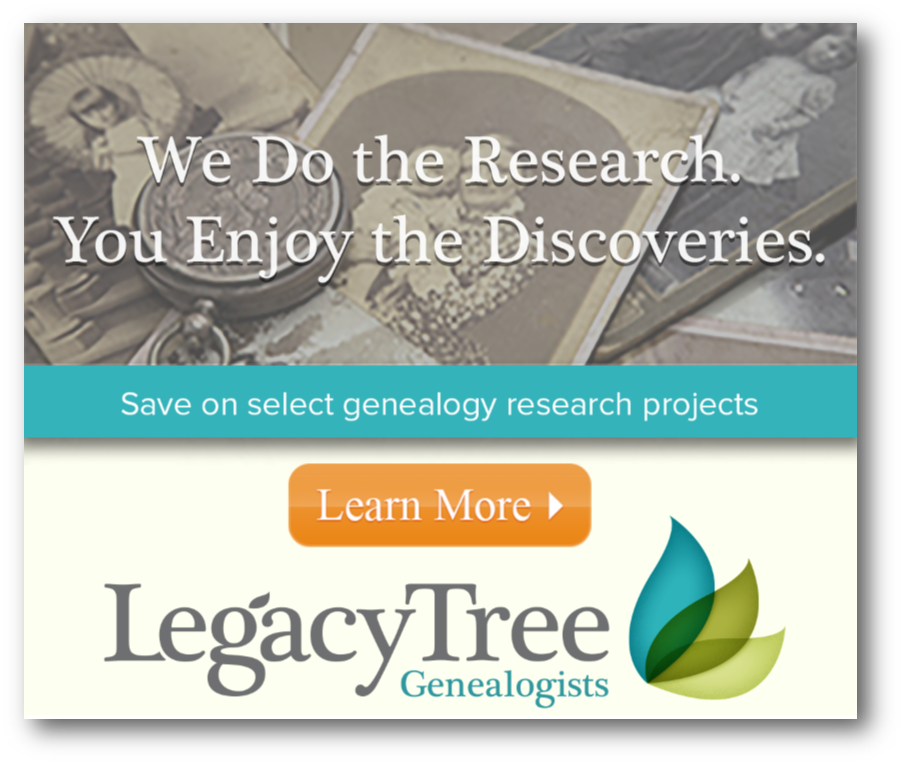 If you have an ancestor in your lineage who may qualify you to join a lineage society, experts at Legacy Tree Genealogists can help you gather your documentation and prepare your application. They are the world’s highest client-rated genealogy research firm. Founded in 2004, the company provides full-service genealogical research for clients worldwide, helping them discover their roots and personal history through records, narratives, and DNA. Based near the world’s largest family history library in downtown Salt Lake City, Utah, Legacy Tree has developed a network of professional researchers and archives around the globe.
If you have an ancestor in your lineage who may qualify you to join a lineage society, experts at Legacy Tree Genealogists can help you gather your documentation and prepare your application. They are the world’s highest client-rated genealogy research firm. Founded in 2004, the company provides full-service genealogical research for clients worldwide, helping them discover their roots and personal history through records, narratives, and DNA. Based near the world’s largest family history library in downtown Salt Lake City, Utah, Legacy Tree has developed a network of professional researchers and archives around the globe.
Contact them today to discuss your options–and your ancestors. EXCLUSIVE OFFER for Genealogy Gems readers! Receive $100 off a 20-hour+ research project from Legacy Tree Genealogists with code GEMS100. Offer good through December 31, 2017.


 Even more historic newspapers are new this week as we head over to Wales. The British Newspaper Archive recently added the Rhyl Journal (Clywd, 1877 – 1897) and Cambrian News (Dyfed, 1863 – 1882) to their database.
Even more historic newspapers are new this week as we head over to Wales. The British Newspaper Archive recently added the Rhyl Journal (Clywd, 1877 – 1897) and Cambrian News (Dyfed, 1863 – 1882) to their database. Do you have Native American ancestry? Or are you interested in Native American history? Then explore Fold3’s Native American Collection for free November 1-15, 2017. Their unique collection includes records, documents, and photos never before seen online. All you need is a free Fold3 account to start exploring!
Do you have Native American ancestry? Or are you interested in Native American history? Then explore Fold3’s Native American Collection for free November 1-15, 2017. Their unique collection includes records, documents, and photos never before seen online. All you need is a free Fold3 account to start exploring!


 in the following information:
in the following information: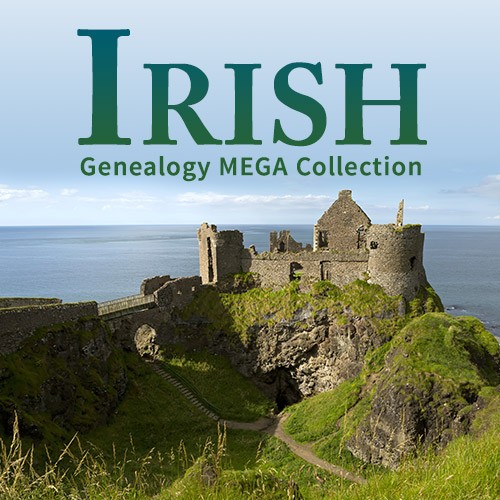

 While each organization has different requirements for their lineage society application, most have the same principles: prove a connection from yourself to the person of interest by use of vital records (where available). Where not available, other documentation that proves family connections can be used. (DAR now also
While each organization has different requirements for their lineage society application, most have the same principles: prove a connection from yourself to the person of interest by use of vital records (where available). Where not available, other documentation that proves family connections can be used. (DAR now also  4. Conduct in-depth research as needed. Many times, at least one ‘problem’ generation requires in-depth research, circumstantial evidence, and a proof summary in order to make the connection. A well-written proof summary explains how all the circumstantial evidence fits together to support the generational link, and often aids the applicant in obtaining membership when not enough concrete documentation is available (or when it conflicts). This often involves delving into land records, tax lists, probate records, and other more obscure sources to find any and all clues and pieces of information that can be used to tie two generations together. It can be a time-consuming task. A professional genealogist can do this efficiently and thoroughly.
4. Conduct in-depth research as needed. Many times, at least one ‘problem’ generation requires in-depth research, circumstantial evidence, and a proof summary in order to make the connection. A well-written proof summary explains how all the circumstantial evidence fits together to support the generational link, and often aids the applicant in obtaining membership when not enough concrete documentation is available (or when it conflicts). This often involves delving into land records, tax lists, probate records, and other more obscure sources to find any and all clues and pieces of information that can be used to tie two generations together. It can be a time-consuming task. A professional genealogist can do this efficiently and thoroughly.